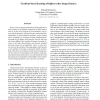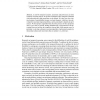145
click to vote
ICCV
2011
IEEE
14 years 2 months ago
2011
IEEE
Recent work on unsupervised feature learning has shown that learning on polynomial expansions of input patches, such as on pair-wise products of pixel intensities, can improve the...
119
click to vote
IJCAI
2003
15 years 3 months ago
2003
Temporal Constraint Satisfaction Problems allow for reasoning with events happening over time. Their expressiveness has been extended independently in two directions: to account f...
113
click to vote
AAAI
2004
15 years 3 months ago
2004
We present an efficient approach to adding soft constraints, in the form of preferences, to Disjunctive Temporal Problems (DTPs) and their subclass Temporal Constraint Satisfactio...
126
click to vote
ACSC
2008
IEEE
15 years 4 months ago
2008
IEEE
Recurrent neural networks are able to store information about previous as well as current inputs. This "memory" allows them to solve temporal problems such as language r...
104
click to vote
CP
1995
Springer
15 years 5 months ago
1995
Springer
We present a method for finding optimal partial solutions to overconstrained instances of the Disjunctive Temporal Problems (DTP). The solutions are optimal in that they satisfy ...
113
click to vote
CP
2004
Springer
15 years 7 months ago
2004
Springer
In real-life temporal scenarios, uncertainty and preferences are often essential, coexisting aspects. We present a formalism where temporal constraints with both preferences and un...


